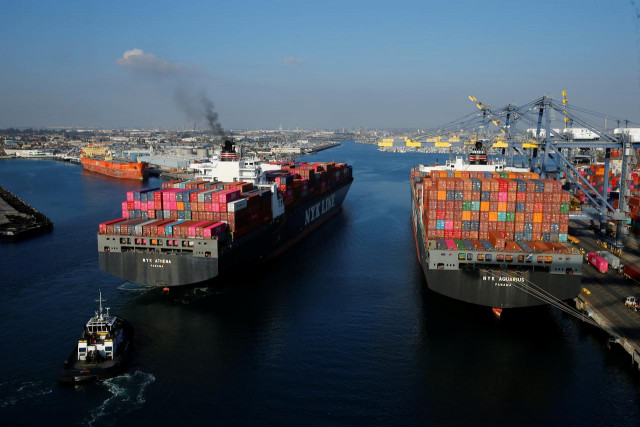Pakistan’s trade deficit contracts 27% to $15.7b
Decline comes due to suppression of imports amid rekindled hopes for revival of exports

PHOTO: REUTERS
In February, export receipts showed an increase of 13.6% and amounted to $2.13 billion, giving a reason for celebration to members of the government’s economic team, who immediately started sending congratulatory tweets.
Export receipts in February hit the highest level in nine months. Last time in May 2019, the exports had risen to $2.1 billion, according to Pakistan Bureau of Statistics (PBS) figures.
Since then, exports have fluctuated between $1.7 billion and $2 billion, which does not reflect the true potential. Historically, exports have stayed around $2 billion a month. The Ministry of Commerce took to Twitter to announce the trade statistics, which otherwise is the responsibility of the PBS.
Total exports increased 3.6% to $15.6 billion in Jul-Feb of the current fiscal year, announced Commerce Secretary Ahmad Nawaz Sukhera through his Twitter handle.
In absolute terms, Pakistan managed to increase exports by $547 million from July through February.
The cumulative increase in exports was appreciable when compared with the export trend in Pakistan’s competing countries and the global economic situation, stated the commerce secretary.
Imports during the eight-month period dropped 14.4% to $31.3 billion, according to the commerce secretary. In absolute terms, imports contracted $5.3 billion, which provided some relief for the government.
After the first review, the International Monetary Fund (IMF) projected that the trade deficit of Pakistan in the current fiscal year would narrow down to $24.3 billion, also slightly lowering its projections due to weakening exports.
The IMF had earlier predicted that exports would grow to $26.8 billion but in its latest report the estimate was revised down by nearly a billion dollars to $25.7 billion.
Overall, the trade deficit, which stood at $21.5 billion in the first eight months of previous fiscal year, shrank to $15.7 billion in the same period of current fiscal year. In absolute terms, there was a reduction of $5.8 billion in the trade deficit and 91% of the improvement came from the import side.
Eight-month exports were equal to 58.2% of the annual target of $26.8 billion while imports were equal to 60% of the target of $51.7 billion.
In the ongoing financial year, due to global slowdown and other factors such as Brexit, exports of India declined 1.9% and Bangladesh’s exports fell 5.2% while Pakistan’s exports increased 3.6%, said Aliya Hamza Malik, Parliamentary Secretary for Commerce and Industry.
She said the textile sector was running on full production capacity and food exports were also rising significantly.
Successive governments have been providing subsidised loans, gas and electricity to the exporters but they have always asked for more. The Pakistan Tehreek-e-Insaf (PTI) government has once again reached an understanding with the exporters, promising them to provide cheaper electricity and gas.
Over a year ago, the PTI government had also given huge benefits to the exporters and in return they promised to revive 200 closed units. But no one talked about the revival of units after winning concessions from the government.
On a yearly basis, exports increased 13.6% to $2.13 billion over the same month of last year, a net increase of $256 million.
In February 2020, imports in dollar terms fell to $3.95 billion compared to $4.14 billion in the same month of last year, which reflected a contraction of over 4.6% or $189 million.
The trade deficit in February contracted roughly 20% to $1.8 billion over the same month of last year due mainly to import compression.
Published in The Express Tribune, March 3rd, 2020.
Like Business on Facebook, follow @TribuneBiz on Twitter to stay informed and join in the conversation.



















COMMENTS
Comments are moderated and generally will be posted if they are on-topic and not abusive.
For more information, please see our Comments FAQ